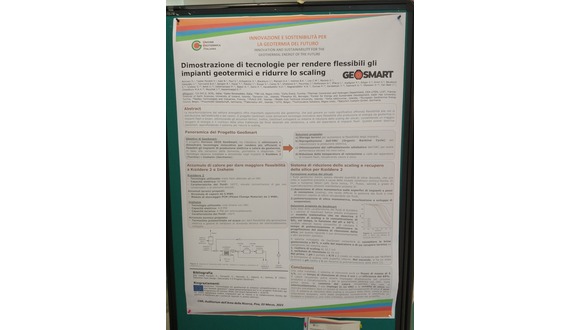Tue, 07 March, 2023
A poster related to the GeoSmart project has been shown during the Italian workshop, ‘Innovation and sustainability for geothermal.’
The initiative, organised by the Italian Geothermal Union (UGI) in Pisa (Italy) on the 3 March, was an important opportunity to strengthen the connection of the national geothermal supply chain with institutions, professionals and citizens.
The event was attended by about 130 participants and explored opportunities and barriers for the sustainable development of medium and high enthalpy geothermal energy for geothermal power generation, district heating and cogeneration, both in Tuscany, where most of the active geothermal plants are concentrated, and in other Italian regions. A connection between institutions, stakeholders, professionals, citizens and the press was facilitated during the workshop, to increase awareness on geothermal and inform participants about the high professional and technological innovation level of this sector in Italy.

A poster session was organised during the event to share updates on solutions to promote the sustainable development and the main technological innovations for deep and shallow geothermal energy, resulting from European and international research and projects. In this regard, COSVIG and Spike Renewables, with the support of the whole project consortium, presented a short abstract and a poster on GeoSmart. Both the works described the innovative solutions that the project partners are implementing to increase flexibility in the electricity and heat production in Inseheim, a binary Organic Rankine Cycle (ORC) plant managed by Natürlich Insheim (Germany) and Kızıldere II, a triple flash plant combined with an ORC managed by Zorlu Enerji (Turkey). The poster and the abstract also focused on a system to recover more heat from fluids after the separator in Kızıldere II and reduce the silica scaling. This system is composed of a scaling reactor, through which silica will be removed by fluids and recovered, and a retention tank for before the fluids are sent to reinjection wells.
The GeoSmart project has received funding from the European Union's Horizon 2020 research and innovation programme under grant agreement 818576.